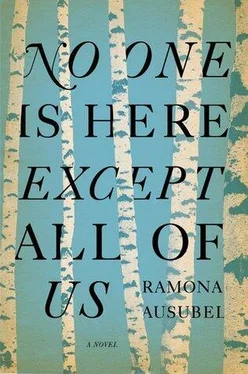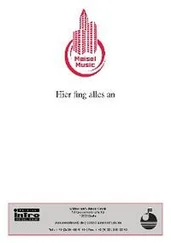There was no point in guessing how many minutes or days before another propeller cut our sky into billowing blue shreds. We began, first in our feet, then in our legs — those rootless stumps — in our sloshing guts and our clamoring hearts, to feel we were being abandoned on this island. The sinking island. Why were we not running downstream with all the rainwater? Why were we standing here, dumb as flags stuck into the earth, when everything that could escape was escaping?
The healer sat down on the floor. He opened the book and began again, his voice loud and sure.
And God said, “Let there be a firmament in the midst of the waters, and let it divide the waters from the waters.” And God said: “Let there be lights in the firmament of the heaven to divide the day from the night; and let them be for signs, and for seasons, and for days and years.”
The healer’s voice turned scratchy and he started to cough. I could not tell the meaning of the tears that streamed down his face. My father handed him a worn handkerchief, and the healer wiped his face.
I closed the door and went to the threshold between the kitchen and the sitting room. “Please keep reading,” I said. He forced the words out.
And God created the great sea monsters, and every living creature that crawls, with which the waters swarmed, according to their kind, and every winged fowl, according to its kind, and God saw that it was good.
And the Lord God formed from the earth every beast of the field and every fowl of the heavens, and He brought it to man to see what he would call it, and whatever the man called each living thing, that was its name.
My father considered me. His brown eyes were gray in the light. His beard was wiry and ragged-looking, his hands stubby. We all stood still. We watched the mountains where smoke still did not rise, where the silver flyer did not circle back. The blast already seemed like a dream, meaningless and impossible.
Wheat blew against the ground in surrender. The sky flattened, the cottonwoods slapped leaves against leaves. The rain kept coming and we kept watching it come. The froth-white river tumbled all of her stones.
And a mist ascended from the earth and watered the entire surface of the ground.
After hours of waiting for the airplane to return, after the rain quieted to a soft dust, under the palm of a cool pink sky, our river sounded like our river again and we crept out to see what the world looked like now that it was coming apart. The air was thick with the scent of soaked sheep. Our feet stuck in the mud, our clothes caught on blown branches. We stood in the wind-combed wheat above the river. The mountains where the explosion had taken place looked no different from how they ever had. The sky was the sky, vast and prickling with light.
The riverbanks were alive with slapping fish. Beached and afraid, they curled up like question marks. “Something to save,” I said, grateful, and I began to gather the fish in my skirt. I walked carefully, the mud slippery and deep, my skinny white legs browning, my socks falling down, until I threw open my bundle in one shining, silver delivery. Back in the water, the fish flicked their tails and disappeared. Everyone joined in, filling dresses and pants pockets and arms with slipping, flapping fish. The fish, stronger than they looked, swam out of our hands and made us laugh. We chased them, saying, “We won’t hurt you. We’re trying to take you home.”
As we worked, the banks stopped glimmering with the jewels of trout, but the river receded to offer other treasures. I picked up the spout of a teapot, filled with silt. The front half of a piano smiled with its teeth punched out. The butcher found a gentlemen’s wool hat with a ribbon around it. From the muck we pulled two bowls, one jewelry box full of mud, a doll with no legs, a matted sweater, some cut logs, a hand-drawn map of the summer constellations smudged but readable, and a woman. A woman — hair, teeth, feet, fingers all. And she was alive.
THE BEGINNING OF THE WORLD
The healer’s living room walls were painted bright yellow, and the windows were trimmed with blue. He had a huge bookshelf reaching all the way to the ceiling. I could read the titles: Engravings from Specimens of Morbid Parts, The Medical and Surgical History of the War, A Lecture to Young Men on Chastity Intended for the Serious Consideration of Parents and Guardians, The Science of Life; Or, Self-Preservation.
Today was no longer a day of rest. God was going to have to forgive us because it was not our fault. The healer boiled several pots of water for tea over the woodstove. The damp wood whined. The healer took everything out of his cupboards — some stale cake, half a loaf of bread, a honeycomb, a jar of last summer’s apples. We dried the woman from the river, the wet and battered stranger, with thread-worn rags. “What happened?” we kept asking, and she kept shaking her head.
“Who are you?” my mother asked while she cleaned the mud out from between the woman’s toes, wrapped her in blankets. Igor served her real tea in a toy teacup, which she drank in doll-size sips. No one said the word prophet , but everyone thought it.
She said, “The plums fell behind me and broke open bloody.”
Wind howled in the trees. It was something alive, something hungry. We drew closer still, felt each other’s warm skin as she whispered, “The living taken by their necks like puppies, and yelping that way, too.”
“By water?” we asked. “By the terrible river?”
“The river saved me. I couldn’t run anymore. My feet were bleeding. The river carried me away. The river made me into a stranger.”
“Now you are safe. Now you are our stranger,” I said. She began to cry.
“The soldiers were allowed to do whatever they wanted to us for twenty-four hours,” she said. “A reward for them, a punishment for us. They cut off my mother’s breasts and my sister’s ears. They lit my husband’s beard on fire.”
We leaned on each other in our huddle. Night’s gluttonous arms gathered everything living, everything dead. Outside, the gawking houses and the grabbing trees. Every wall could easily become a window, every roof a wide-open path to God.
The stranger stopped speaking. Her breathing changed and then she howled like a lost dog. Her voice became full and enormous, rattling off the walls. We were rattled, not only by the stranger’s howl, but also by the desperate seas of her eyes, the map of cuts all over her arms and chest. The flood of her voice was like the flood of water, sudden and determined, sweeping up everything in its path.
“Do you need to be hidden?” I asked.
“What’s left to hide from?” the stranger asked back.
In the silence of that moment, our hearts kept us alive without asking if they should.
“Everyone is gone?” I asked.
“Everyone,” the stranger said.
“Everyone’s children?” Igor asked, focusing on his crop of siblings.
An old woman said, “I want to lie down,” and another old woman offered her lap and brushed her fingers through the threads of hair, warm and tangled.
We lit a few lanterns because we had lost all the light from outside.
Someone pushed a cup of soup toward the stranger, tapped the rim with the spoon to say, Is this something we can offer you?
The stranger took a small sip of soup from the bowl and then passed it along. We each put our lips to it so that they got a little coating of the hot liquid on them and then passed, wanting it to come back around to her still full. “Thank you,” we said, “it’s delicious.” And we were happy when it did come to her and she took full bites this time, filling the spoon and then pulling it clean from her mouth.
Читать дальше












